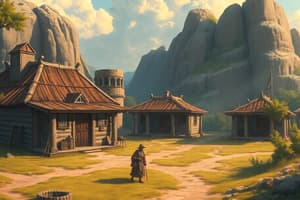Podcast
Questions and Answers
What was a significant factor that likely contributed to the first Americans reaching North America?
What was a significant factor that likely contributed to the first Americans reaching North America?
- Trade routes established by European explorers
- Advanced maritime navigation technologies
- The invention of the wheel
- A land bridge connecting Asia and North America (correct)
Which of the following civilizations were among the most advanced in the Western Hemisphere?
Which of the following civilizations were among the most advanced in the Western Hemisphere?
- The Egyptians, Sumerians, and Babylonians
- The Ming, Tokugawa, and Gupta Empires
- The Phoenicians, Greeks, and Romans
- The Olmecs, Incas, and Aztecs (correct)
What new social class emerged in Europe as trade with the Orient increased?
What new social class emerged in Europe as trade with the Orient increased?
- Aristocracy
- Knights
- Peasantry
- Merchant class (correct)
Who is credited with initiating the Protestant Reformation and in which century did this occur?
Who is credited with initiating the Protestant Reformation and in which century did this occur?
Which invention is considered crucial in bringing Europe out of the Dark Ages, and who is associated with this invention?
Which invention is considered crucial in bringing Europe out of the Dark Ages, and who is associated with this invention?
Flashcards are hidden until you start studying
Study Notes
Migration to North America
- The first Americans likely arrived via the Bering Land Bridge connecting Asia to North America during the last Ice Age, around 15,000 years ago.
Advanced Civilizations in the Western Hemisphere
- The Maya: Known for their advanced writing system, architecture, and calendrical system.
- The Aztec: Famous for their capital Tenochtitlan and the development of a complex society with a strong religious framework.
- The Inca: Renowned for their vast empire along the Andes, incredible engineering, and impressive agricultural practices.
Effects of the Crusades on World History
- Increased trade between Europe and the Middle East, introducing new products and ideas to Europe.
- Weakened the feudal system, leading to the rise of centralized monarchies.
- Stimulated exploration and a wider worldview, setting the stage for the Age of Discovery.
Rise of a New Social Class in Europe
- As trade with the Orient grew, the merchant class emerged, gaining wealth and influence, contributing to the decline of feudalism.
Emergence of Powerful Nations in Western Europe
- England: Developed a strong centralized monarchy and expanded globally.
- France: Consolidated power through territorial expansion and strong kings.
- Spain: United under Ferdinand and Isabella, became a global power following the Reconquista.
- Portugal: Established a maritime empire, leading to significant exploration.
Invention that Transformed Europe
- The printing press, invented by Johannes Gutenberg around 1440, significantly enhanced literacy and the spread of ideas, helping to end the Dark Ages.
Beginning of the Protestant Reformation
- Initiated by Martin Luther in 1517 with the publication of his Ninety-Five Theses, challenging the practices of the Catholic Church.
Connection Between Renaissance, Protestant Reformation, and North America
- The Renaissance fostered a spirit of inquiry and exploration, while the Protestant Reformation encouraged individual interpretation of faith, laying the groundwork for the exploration and colonization of North America.
Key Historical Figures and Concepts
- Leif Erikson: Norse explorer believed to have reached North America around 1000 AD.
- Iroquois Confederacy: An alliance of indigenous tribes in North America known for its political and military organization.
- Feudalism: A social system prevalent in medieval Europe defined by land ownership and a hierarchy of obligations.
- Reconquista: The campaign by Christian states to recapture territory from the Moors in the Iberian Peninsula (completed in 1492).
- Moors: Muslim inhabitants of North Africa and Spain, influential in the regions they controlled.
- Nationalism: A political ideology that emerged in Europe, emphasizing loyalty to the nation-state and cultural identity.
- John Calvin: A major figure in the Protestant Reformation known for his doctrines of predestination and the sovereignty of God.
Studying That Suits You
Use AI to generate personalized quizzes and flashcards to suit your learning preferences.




